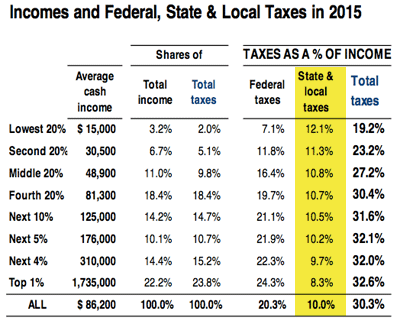A lot of people think the federal tax code should be more progressive, but it looks downright socialist compared to the typical state tax code. A chart released last week by Citizens for Tax Justice puts it in context, showing how the wealthy typically pay lower state tax rates:

This problem isn’t limited to conservative states: According to a recent report by the Institute on Taxation and Economic Policy (ITEP), every state places a higher effective tax rate on the poor than it does on the rich. In fact, several of the nation’s most politically progressive states count among the worst when it comes to shoveling the tax burden onto low-income people and the middle class.
The nation’s most regressive tax code belongs to Washington, a state that was ranked by The Hill last year as the bluest in the country based on its voting patterns and Democratic dominance. The poorest 20 percent of Washingtonians pay an effective state tax rate of 16.8 percent, while the wealthiest 1 percent effectively pay just 2.4 percent of their income in taxes.
There’s a clear explanation for that: Washington has no income tax and thus heavily relies on a sales tax that disproportionately affects the poor. What’s harder to grasp is why Washington’s liberals put up with it.
Structural conditions help explain why regressive taxes endure in Washington and many other states. Some states require supermajorities to raise taxes or have constitutions that mandate a flat tax. In Washington’s case, voters approved a personal income tax in 1932 by a two to one margin but were overruled the following year by the state Supreme Court, which decided that a constitutionally mandated 1 percent cap on property taxes also applied to income. An income tax bill passed by the state legislature a few years later was likewise struck down.
But the courts, weirdly, are no longer the biggest obstacle to a fairer tax code in Washington; over the years, they’ve gradually overturned most of the legal precedents that had been used to invalidate an income tax, and most experts believe such a tax would become law today if passed. The bigger problem is voters. In 2010, Washingtonians rejected by a whopping 30-point margin a proposal to establish an income tax that would only have applied to people earning more than $200,000 a year.
How do you square this with California, where, just two years later, a similar tax hike on the wealthy easily sailed through? Or with Oregon, Washington’s political cousin, which has long had a progressive income tax?
I asked John Burbank, the executive director of the Seattle-based Economic Opportunity Institute and an architect of Washington’s failed 2010 income tax measure, why he thought the measure had failed to pass. At first, he cited the off-year election and opposition scare tactics. But when pressed, he offered a third explanation that I think makes more sense: “There is almost like a cultural prohibition that exists.”
In other words people, liberal or conservative, who live in states with low or no income taxes get used to paying little. They may differ on protecting the environment, legalizing weed, or raising the minimum wage, but when you start to mess with the system on which they’ve built their personal finances, they get scared and balk. This is why changing the tax code is so hard, even in states where people may in their hearts believe it’s the right thing to do.

















